#Pu Yin
Explore tagged Tumblr posts
Text
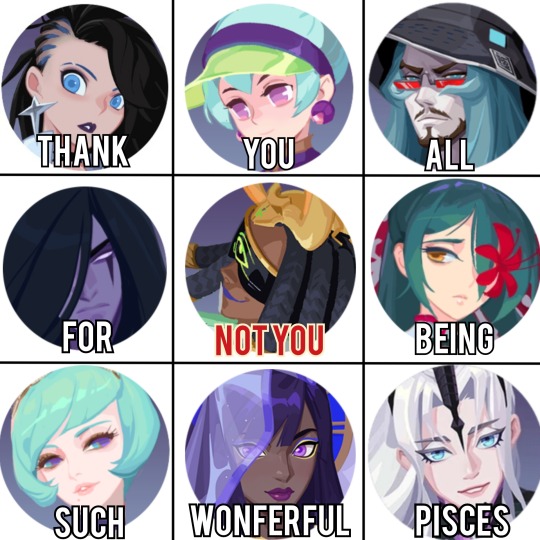
Too all my fellow Pisces, and Dislyte artists out there, happy pisces season! We pisces are too to be true wonderful ✨
Here is a little silly edit I did for the occasion♓🐟
#dislyte#pisces#pisces season#my edit#dislyte brynn#dislyte chang pu#dislyte zhong nan#dislyte hall#dislyte kara#dislyte jiang man#dislyte celine#dislyte asenath#dislyte xiao yin
43 notes
·
View notes
Text
Asian dramas and relationship dynamics (Pt.1)
There are my favorite relationship dynamics as a list. Opposites attract + power couple
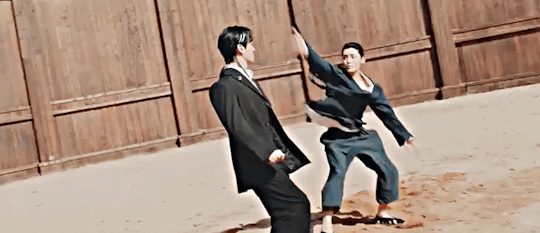
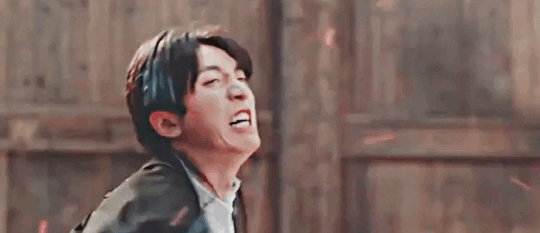
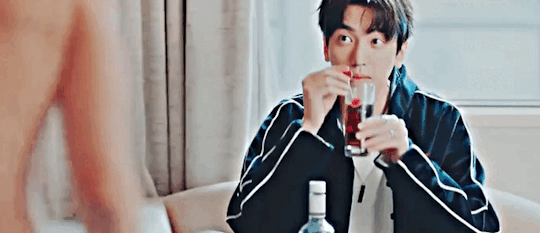
Drama: I Am Nobody / 异人之下 Characters: Zhuge Qing & Wang Ye Screentime: Minor I like it when characters are different in a way they could complement one another, but at the same time they are similar in terms of what is important for people to stay stuck together. Zhuge Qing is public, easy-going and wants to be friends with Wang Ye. Wang Ye is mysterious, reflexive and doesn't want to be bothered by other people. But no one can beat extrovert if he decided to be friends with you =) Plus, they are united by their superpowers: they are both powerful sorcerers and their sorcery is very similar in its nature. So they can compete and learn from each other and, if necessary, kick enemy's ass together. ̶A̶n̶d̶ ̶t̶h̶e̶i̶r̶ ̶d̶y̶n̶a̶m̶i̶c̶s̶ ̶h̶a̶s̶ ̶g̶o̶t̶ ̶t̶h̶i̶c̶k̶ ̶B̶L̶ ̶v̶i̶b̶e̶s.̶ By the end of season 1 they are OK and together.
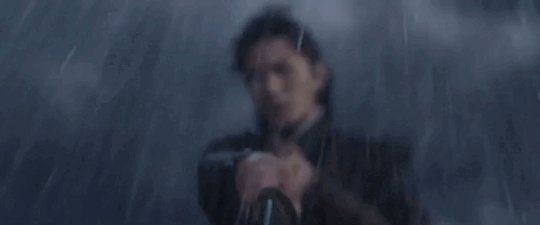
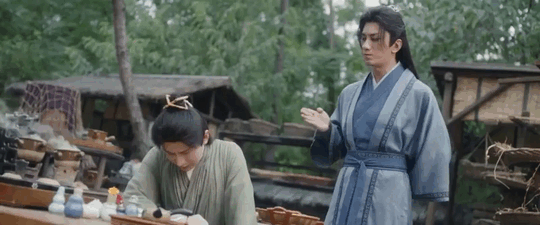
Drama: Mysterious Lotus Casebook / 莲花楼 Characters: Di Feisheng & Li Lianhua Screentime: Secondary Di Feisheng is a leader of a demonic sect, a former slave and a very straightforward man. Li Lianhua is a former leader of a righteous sect and an extremely sly man with not-so-bad background. But both of them are the best martial artists in Jianghu and went through a lot together. One wants everyone to leave him alone, another wants to be with him together forever. Both of them don't give a damn about everything that happens in the world but they care for each other. B̶L̶-̶v̶i̶b̶e̶s̶ ̶a̶r̶e̶ ̶a̶t̶t̶a̶c̶h̶e̶d̶.̶ The ending of the drama is obscure but I'd like to think they both are alive and happy together.
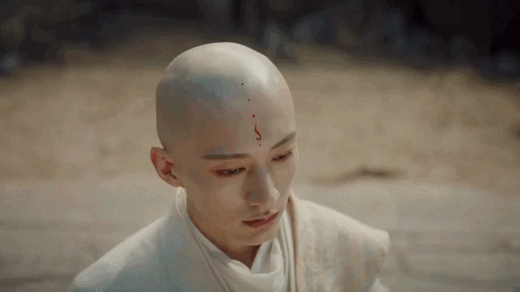
Drama: The Blood of Youth / 少年歌行 Characters: Xiao Se & Ye Anshi Screentime: Secondary A leader of a demonic sect who has an ultimate martial knowledge and a former best righteous martial artist, who is suffering from decease and can't fight anymore. What can unite them? The answer is: the similar mindset. They both had a great power and lost it, they both are shouldering great responsibilities which don't make them happy. Despite the fact that they should be on the opposite sides in Jianghu world, they are still good friends. M̶a̶y̶b̶e̶ ̶B̶L̶-̶f̶r̶i̶e̶n̶d̶s̶,̶ ̶a̶l̶t̶h̶o̶u̶g̶h̶ ̶X̶i̶a̶o̶ ̶S̶e̶ ̶h̶a̶s̶ ̶a̶ ̶g̶i̶r̶l̶f̶r̶i̶e̶n̶d̶.̶ There is a small extra ep at the end of drama, when they meet each other again in a very romantic way. Just search for it.

Drama: The Legends / 招摇 Characters: Lu Shiqi & Qin Qianxian Screentime: Minor She is from a demonic sect. He is from a righteous one. She is immune to the impact of spiritual power. He is the one of the most powerful people in terms of spiritual power. She is dumb, straightforward and pure-hearted. He is blissed yet sensible and burdened with difficult moral choices. They could be an ideal Yin-Yang couple. But they have BE, because it's "The Legends", everyone should die in here Т_Т.
Pride and Prejudice + power couple

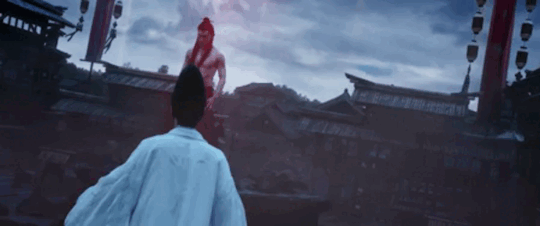

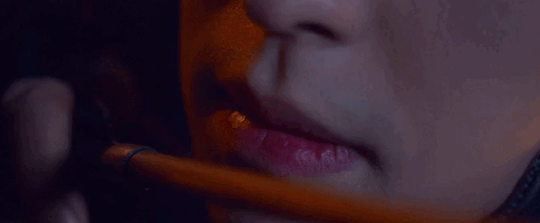

Drama: The Yin-Yang Master: Dream of Eternity / 晴雅集 Characters: Bo Ya & Qing Ming Screentime: Main This dynanics is similar with the previous one, but here we are focused on how they ended up together. Bo Ya has prejudice against demons-yao and believes all of them should be executed. He meets half-demon-sorcerer Qing Ming who helps him to overcome his prejudice. Finally, they become friends (or̶ ̶m̶a̶y̶b̶e̶ ̶n̶o̶t̶ ̶o̶n̶l̶y̶ ̶f̶r̶i̶e̶n̶d̶s̶) and together they win over the evil forces. At the end they are separated but there is a hope they meet again.
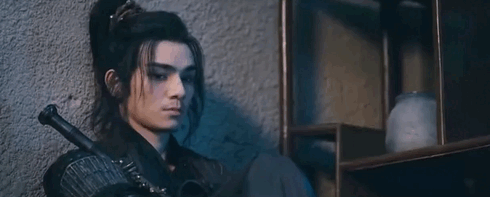
Drama: Wuliang / 无量 Characters: Po Xiao & Feng Ren Screentime: Main People of different social status both seek to get a magical sutra. During a road trip they exchange opinions on the sutra and how to use it and change each other's mind. In the end it turns out that they together saved the world and can be finally together. As friends, of course.
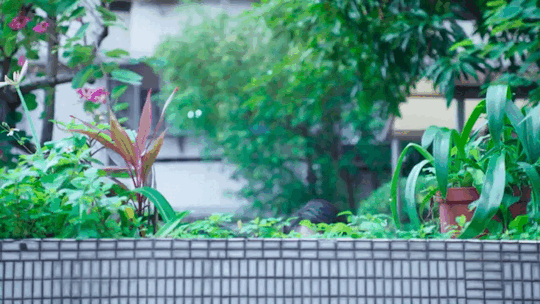
Drama: Oh No! Here Comes Trouble / 不良執念清除師 Characters: Pu Yiyong & Cao Guangyan Screentime: Main Pu Yiyong looks like lowlife, studies very bad and hates Cao Guangyan, who is self-confident, smart and thinks low of Pu Yiyong. But a mysterious case with ghosts forces them to interact and they find out, that together they are a perfect team. Honestly speaking, this little series couldn't develop this topic as good as I hoped, but it's a really interesting story, so you can watch it for the ghost detective plot and get this type of relationship in addition. It's a Taiwanese drama, so BL-jokes and dalliance with a viewer were huge, but it didn`t help much. Still a nice dynamics and a good drama. Us vs the World
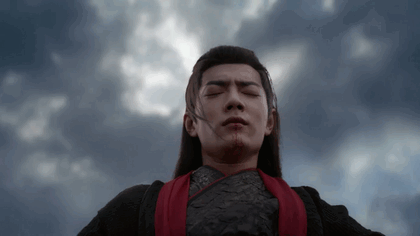



Drama: The Untamed / 陈情令 Characters: Wei Wuxian & Lan Wangji Screentime: Main I don`t like the novel, but I like drama exactly because here I can see this dynamics. In the past life of Wei Wuxiang Lan Wangji was not strong enough to go against the whole world to protect his friend (well, in the novel they are lovers, but it kills the main idea of this dynamics by turning it into "I do it all just to get into your bed", which is meh), and his friend died. Suddenly, 16 years later, he gets a chance to choose once more: to be a part of society and watch once more his friend dying or to be with him against everyone this time. The moment he chooses to be with Wei Wuxian against the whole world I felt cathartic pleasure. The drama ends up on a little bit obscure but positive note.
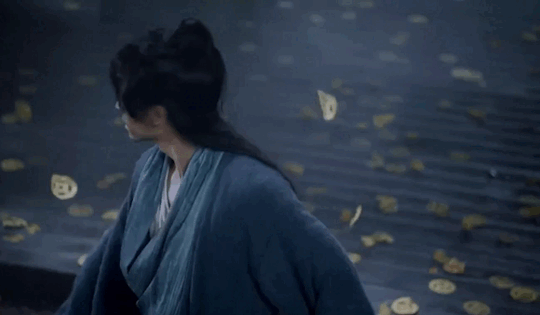

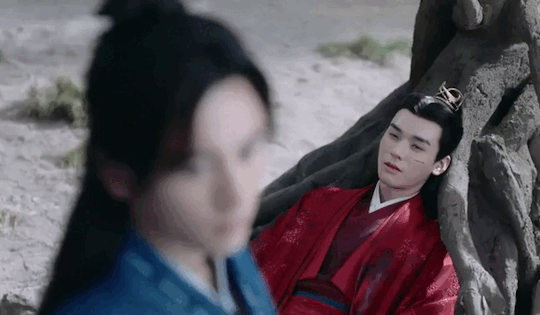
Drama: Word of Honor / 山河令 Characters: Zhou Zishu & Wen Kexing Screentime: Main A former king's assassin who is at the brink of death and just wants to live the time left in silence and a birdy master of the most skillful criminals find each other, find out that they are brothers-in-teachings and decide to fight against the world together just to live in silence and enjoy each other's company. When one thinks it's his last second of life, the other comes to help him even if they both can't beat the greater number of enemies and will die for sure. Catharsis! The drama has a small extra ep where they are together and all right.

Drama: The Legends / 招摇 Characters: Li Chenlan & Lu Zhaoyao Screentime: Main Them, again! The first half of the drama they have enemies-to-lovers dynamics, but then, when they find out the truth about Zhao Yao's death and about feelings for each other, they turn into Bonny and Clyde and go annihilate the righteous guys who are in fact not-so-righteous. And it makes me feel cathartic, too. A very catharsis-causing dynamics, indeed! It's little obscure, but they will be fine at the end of the drama.

Drama: Dong Lan Xue / 东栏雪 Characters: Shen Yan & Chu Ningyuan Screentime: Main Two bad guys work together to get power in the palace. And get involved in romantic relationship during their power gaining. Nice story with an open ending.
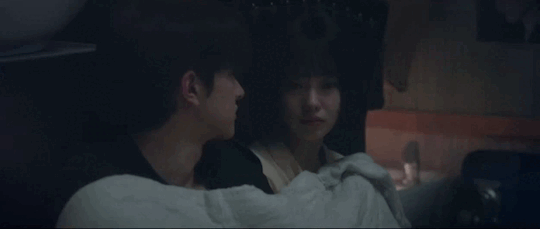
Drama: Derailment /脱轨 Characters: Qi Lian & Jiang Xiaoyuan Screentime: Main It's a little story inside a big one about transmigrators that you can read in another of my posts. It lasts something like 1,5 eps of the drama but is a nice story itself. A lonely bellicose boy from a rich family runs away from home where no one cares for him and lives on the street. A lonely girl from an extremely poor family and being bullied by classmates tries to survive in this world. They meet each other and understand that it's easier to fight their fate together. Nice story, it's a pity that this one is too short and not a main plot of the drama.
Descent

Drama: The Spirealm / 致命游戏 Characters: Ruan Lanzhu & Ling Jiushi Screentime: Main
It's a really rare but interesting dynamics (and it is a huge spoiler to this drama itself, so beware): the god-like creature (a monster of the 12th door in the novel "Kaleidoscope of death" and a VR-virus in its adaptation, "The Spirealm") has to keep company to a mere person. During their journey, a god-like creature finds out that said mere person is not really mere, and unexpectantly develops feelings for him, which cause his "descent" and allow him to be a little bit less ethereal and a little bit more human. I like the drama more than the novel, but the lore and the story are great in both of them. The novel has HE and the drama ending is controversial: you can consider it as BE or as delayed HE, but it's heart-wrenching, powerful and logical. Also you can see: Asian dramas and relationship dynamics (Pt. 2) Asian dramas and my favorite types of characters Asian dramas and Love tropes Enemies to Rivals/Lovers recipe
#cdrama#tropes#movie tropes#SDabouttropes#the legends#period drama#costume drama#xianxia#twdrama#bl drama#wuxia#modern drama#i am nobody#derailment drama#Dong Lan Snow#word of honor#The Untamed#oh no! here comes trouble#Wuliang#The Yin-Yang Master#the blood of youth#mysterious lotus casebook#the spirealm
255 notes
·
View notes
Note
Hello! Sorry to bother you.
I noticed you are in JTTW fandom and wanted to ask if you know where can I find more info on Sun Wukong's make up and stage performance? I tried to find stuff on my own but quickly realised that I'm just one small weak goblin. I saw some blogs about chinese opera behind the scenes with SW images and couple of videos but that's about it... and since you look like you are way more knowledgeable I came here to beg a favour.
Do you know any videos, documentaries or blogs on this topic?
Thank you for your time ♥♥♥
Hi!
TLDR: Bold text are writings/videos linked to Peking Opera Culture and specifics surrounding Monkey King performances. Post has a mid-length summary of key aspects of his Peking appearances and core thematics. This mainly goes along visual design analysis, as I don’t focus in performance art as much! Read more divide for courtesy
(Also taking a moment to highly praise @/bonesmarinated ‘s Peking opera Wukong pieces!)
The Monkey King/Sun Wukong is a very well covered and well performed character in Peking Opera, I’ll give a short(ish) summary of the key aspect of his design across various performances based on work I can recall from my Undergrad as well as my own experience- and i’ll link any documents/websites/images I have on hand
Wukong’s Lian Pu falls under what is known the Jing role (complex hero) with similar facial decoration also being delegated to the Chou roles in Opera as well.
The dominant school of art in depicting him either on live performers or maskwear, have a fairly universal foundation for his appearance.

The oldest forms of Peking opera stick to Wuseguan (Five Colour Theory) with his Lian Pu sticking to a core 3 of White (Cunning), Red (Bravery), and Black (Loyalty). Even with Modernisation of the Peking Opera and developments in the science behind art and makeup, Lianpu is specific in its purpose of portraying the nature of a character beyond body language and aiding in accessibility for people at the far end of the audience.
The Monkey King’s Lian Pu is reflective of his mischievous and bold nature, combining it with the shape of an Old World Monkey’s furless face shape so that even those “uneducated” in Peking Opera culture can at least see /what/ Wukong is before they see /who/ he is. The White and red placement are linked to yin-yang dynamics relating to the stone he was born from and the energy it cultivated) as well as general themes beyond the tale itself.
Zheng’s “Evolution, Symbolism, and Artistry: A Study on the Colors of Peking Opera Facial Makeup” Discusses this in more detail. ( DOI: 10.23977/artpl.2023.041207) (ISSN 2523-5877)
(General Mask colours in Peking Opera, separate from Lian Pu: The Cultural Connotation and Symbolic Meaning of Chinese Opera Mask Color - Hanbing Tu)
In more modern designs, the key foundation of Wukong’s face doesn’t change much, however some variations do add colour to Wukong’s eyelids- mainly pink or yellow/gold. Both of these relate physically to the ‘whites’ of Old World Monkey’s eyes, with the yellow face paint being representative of “barbarism” or “savagery”. Gold is used on the faces of various immortal creatures from all backgrounds as Silver is.


(Left: Chu Luhao as Monkey King, stedling divine peaches and wine in celestial realm, Kaohsiung ) (Right: Monkey King Wukong in Beijing Opera Journey to the West at Liyuan Theater)
As with Taiwans branch off in culture, This Lian Pu on the left shows the eyebrows as the top of the eyelid makeup, contrast to Chinese style and other Sino-influenced regions. This works in Chu Luhao’s production as it plays towards the character Wukong is before he’s sealed under the mountain and begun the journey- hence more “wide eyed”.
Mentioning Yellow within the Wuseguan, this is why most of his earlier outfits have such a heavy bias towards yellow cloth, barbarism being represented across his whole body (his form, as a monkey over his soul that achieves enlightenment) with costumes later down his hero’s journey adding more black, blue (simplicity).



(Left: Performer playing Monkey in Journey to the West, Chinese Opera performance in Singapore) (Middle: Chu Luhao’s production, Sun Wukong arrives at the Dragon Palace of the East Sea) (Right: CANTON, CHINA – CIRCA JULY 2019: Beijing Opera performance of “Monkey King Making Havoc in Heaven”)
Key Read -> The Artistic Symbolism of the Painted Faces in Chinese Opera: An Introduction, David Ming-Yüeh Liang. https://www.jstor.org/stable/43560653
Book -> Chinese opera: Images and stories, Peter Lovrick, Wang-Ngai Siu
Book -> Drama kings: Players and publics in the re-creation of Peking opera, 1870-1937, Joshua Goldstein. https://books.google.co.uk/books?hl=en&lr=&id=XT_1fZ9Jp18C&oi=fnd&pg=PP1&dq=info:49R3XREYwVoJ:scholar.google.com/&ots=3OF1F4SILK&sig=gQyW7bGJzgnxG62Y2TxU01ZPazQ&redir_esc=y#v=onepage&q&f=false
This analytical paper on Monkey King: Hero is Back showcases modern animated links to Peking Monkey King designs - https://fslmjournals.taylors.edu.my/wp-content/uploads/SEARCH/SEARCH-2024-16-1/SEARCH-2024-P5-16-1.pdf
A blog site I found interesting was an interview with Yao Yudong, the successor to colourful Peking Opera masks, where he discusses creating the mask designs (with a Wukong mask as a recorded example) and a more in-depth written post. He expresses the key two styles of Wukong’s red markings known as “Upside down Gourd” style, and the less complex “Upside down Peach” style attributed to a different art school. In which his mask is directly attributed to items that come into contact with his face.
Jiao Feng, Peking Opera Facial Makeup: The Art of Face Painting: http://www.chinatoday.com.cn/ctenglish/2018/ich/202001/t20200117_800190202.html
Connected is a video of an Opera performer who does his own Lian Pu, which depending on the time period could take up to two hours. Although this design is significantly more contemporary in the use of gold on white sections as markings like black paint. https://x.com/chinadaily/status/1365730927133958144?s=46&t=06bYiE12l6qVJUxPCBuvvQ
In regards to Wukong’s combat performances, he falls into the role of a Wusheng (武生), which is the strand of stage costume used in representation of his staple armour.

(Monkey King in Journey to the West Performance, Beijing Opera)
In this costume, Wukong’s Phoenix feather cap is mirrored by Lingzi (翎子) or Zhilling (雉翎), which likely play back and forth with influencing eachother as time progresses, due to Wukong’s theatrical personality being heightened by the Pheasant tails and their movements as actors play their roles. In his Wusheng roles, he is more likely to be adorned with gold eyelids to highlight his layered immortality and connect to the golden armour he wears. The trait of biting the pheasant tails as a theatrical act of frustration is seen across adaptations, most recently in Black Myth: Wukong’s Chapter 6 Animation.
This animation’s design seems to relay the Lingzi strongly due to the way the studio details the lowest connection points to the crown ornament.

As stated in Bond’s writings “BEIJING OPERA COSTUMES: THE VISUAL COMMUNICATION OF CHARACTER AND CULTURE”, Wukong’s in-game Suozi Set and various adaptations Dragon Palace armours split similarly to the Kao (Armour) on Peking stages, with the falling of the frantic drastically increasing the size of the actor and his silhouette.
Qing-era flags on the costumes of Wusheng were used to express social standing, gender, nature, and ranking. The image above showcasing them has them match the Kao pattern of the clothing, other flags often held zodiac patterns- with the monkey showcasing vain, egotistical, inventive and tricky individuals; and the peach included in a flag hinting towards immortality.

(Ching Dynasty Year of the Monkey Flag used in the Peking Opera) Zaricore Flag Collection: https://www.flagcollection.com/itemdetails.php?CollectionItem_ID=943
Due to the History of Lian Pu, and Wuseguan, despite modernisation of Opera arts vastly widening the colours and complexity of costumes; Wukong sticks to a key 5 colour scheme, with a emphasis on the original trio of red-white-black, and gold being reserved for Wusheng/Wuxiaosheng to showcase immortality and strength. The prevalence of Opera alongside fictional theatre means that the two constantly play off of eachother in mannerisms and influence, both at the time of JTTW’s writing to the 21st century. But as Opera is a physical performance, all aspects of Peking costume design is meant to make the emotional and psychological aspects of characters physical, to a large audience space needing to see facial expressions heightened and clarified by Lian Pu.
Read -> Cultural-based visual expression: emotional analysis of human face via Peking Opera Painted Faces (POPF)
#i hope that “’more’ button works bc this is so going to clog up everything otherwise#hope this helped! i mainly know written sources due to academia#however i find best learning written theory and watching recited peking is the best way to approach it#wukong is a fascinating one bc of how intertwined literature and theatre is in this context#sun wukong#journey to the west#jttw#wukong#peking opera#but just stick to the bold text to find written sources and academia#black myth wukong#son goku#chinese opera#also sorry if this is worded badly uni has kicked my ASS this week
53 notes
·
View notes
Note
Hello!!! Stumbled upon this blog on a casual scroll-through and am super impressed at how thorough and passionate it is!! Kudos!!
I had a question, if it’s not too much of a bother:
Is there any sort of artifact mentioned in JTTW (or Chinese mythology at large) that’s been used to contain a yaoguai’s power/take it away from them? Maybe in the vein of Guanyin’s vase? Sorry if this doesn’t make sense.
So what you are asking for is something that can take away cultivation so to speak? There are some tv/movies that do show other yaoguai that are able to eat the life force of yaoguai and forcing them back into their original state therefore taking away their power and their humanoid form.
However that is more popular in modern media, as for any canon items they are more focused on subduing and capturing rather than depowering.
Gaunyin's vase sadly hasn't been able to show any depowering abilities either if you were asking about that. It has been show to whole an entire ocean and that it can hold healing water. But there are movies where she is able to capture demons (such as Wukong) in her vase and keep them in a state of status. But I don't know how in canon that is as she does have a lot of history outside of journey to the west.
But on to magical items in journey to the west! I shall rank them from most subduing to least subduing
Subduing Buff Attacking
Golden Jade Ring (金剛琢) - it can change size, is invulnerable to water and fire, can strike all things, collect various magic weapons and weapons, and has infinite uses. Laojun used this treasure to knock down Sun Wukong and help Erlang Shen capture him. The One Horned King used this treasure to take away Sun Wukong's golden hoop, Nezha's six weapons, and the magic weapons of hundreds of gods and generals. It can even dissolve water, fire, thunder and lightning. Later, Taishang Laojun, who came down to the world himself, defeated it with a fire-type banana fan. This was the thing that put Wukong stop in his tracks, doesn't take away power but def the most powerful.
Flask of Yin and Yang Essence (陰陽二氣瓶) - it contains the Seven Treasures and Eight Diagrams, twenty-four Qi, and requires thirty-six people, according to the number of Tiangang, to lift it. This treasure can hold a person and if a person does not speak, the bottle will be very cool. But once they speak, fire will burn them into pulp water in a moment. Wukonghad to use his Golden Hair he was given by Guanyin to escape. While not invincible it took another magical item to counteract it and thus very powerful.
Golden Cymbals (金鐃) - the magic weapon used by the Yellow-Browed Monster who trapped Sun Wukong inside and would have turned to puss inside it if he didn't escape. Sun Wukong escaped from the golden cymbal with the help of Kang Jinlong and immediately broke it. Took nearly an army to escape it, very powerful.
Purple Gold Red Gourd (紫金紅葫蘆) - as long as you call out your opponent's name if they respond, the elixir will pull them inside. Then a note with the words "The Supreme Lord Laozi, please obey my command as soon as possible" will be posted on it, and the elixir will turn into pus in a few hours. Hard to say how powerful this is since Wukong escaped it twice turning into a bug so... take that as user error or not.
Human Sack (人種袋) - Sun Wukong invited the twenty-eight constellations, the two generals of the tortoise and the snake, the five great dragons, Prince Xiao Zhang and the four great generals, but they were all put into the monster's bag. Later, Maitreya Buddha took back the human seed bag and put the demon king into the bag. Very powerful but does not kill, so less of a threat.
Golden Cloth Rope (幌金繩) it was originally a belt used by Taishang Laojun to tie his robe. It has a tightening rope spell but also a loosening rope spell and if a user knows both they most likely will not be affected. Powerful but if you know the loosening spell it is useless.
Suet Jade Flask (羊脂玉淨瓶) this was used by Taishang Laojun to make elixirs and hold water. It has space inside to hold water from all over the world.
Seven Stars Sword (七星劍) - the real sword from the Ming and Qing dynasties that has survived in modern times was used by Tan Sitong. The seven stars are mainly symbolic, but from the perspective of material mechanics, they should have the function of buffering stress concentration and preventing the sword from breaking.
Palm Leaf Fan (芭蕉扇) - The two banana fans, yin and yang, are held by Taishang Laojun and Princess Iron Fan respectively: the banana fan used by Taishang Laojun is yang, and the six Ding divine fire it fanned is the power source of the alchemy furnace; the banana fan used by Princess Iron Fan is yin, and its water vapor can extinguish the fire in Huoyan Mountain. The two fans are mutually reinforcing and mutually restraining. There are prototypes that can be traced in reality.
Banana Leaf Fan (芭蕉扇) - The extremely yin treasure fan can fan out water vapor, and water can extinguish fire, so it can extinguish the 800-li Flame Mountain. "Journey to the West" Chapter 59 "Tang Sanzang's Road Blocks the Flame Mountain, Sun Xingzhe Uses the Banana Fan" "...Her banana fan was originally a magical treasure created by heaven and earth since the beginning of chaos behind Kunlun Mountain. It is the essence of the Taiyin, so it can extinguish fire." The yin wind fanned out can make people drift 84,000 miles before it can stop.
Purple-Gold Bells (紫金鈴) - This Purple Gold Bell was forged by Taishang Laojun in the Eight Diagrams Furnace, and it is very powerful. Shake it once, and fire will come out. Shake it twice, and smoke will come out. Shake it three times, and sand and rocks will fly. Sun Wukong stole the golden bell and then subdued "Sai Taisui".
If you are looking for more magic items that can take away cultivation I actually think that there is something in FSYY that took away some daoists' cultivation... but I think that was more of a formation than an item... I'm sorry I didn't take notes on but that novel DEF has a lot of magical items!!
#anon ask#anonymous#anon#jttw#journey to the west#xiyouji#ask#investiture of the gods mentioned#high key rec trying to find a list there#though i think that would be hard to find#the book is kinda long and boring but a lot of neat stuff
53 notes
·
View notes
Text
In the source link, you’ll find 245 HQ textless all under 5MB 268x151 gifs of Yu Shu Xin/Esther Yu as Chu Li in 1x02 of Moonlight. These gifs were ALL made by me. I don’t mind if you use them in crackships or edit them into icons as long as you credit/tag me. But DO NOT put these into other gif hunts or repost them into gif sets! DO NOT use my gifs to roleplay characters that are minors or in smut threads. DO NOT use my gifs to roleplay real life people/celebrities, or in any taboo situations! If any clarification is needed, please feel free to ask! Please like or reblog if you find this helpful and don’t claim them as your own! If you’re a fan of my work and have a few dollars to spare, please consider buying me a coffee! (paypal available upon request) Credits: PSDs: @gifpackisms & myself TASKS WEEKLY: #040 - Chinese ETHNICITY: Han Chinese, please cast her accordingly! TRIGGER WARNINGS: Flashing gifs, getting hurt. FEATURING: Ding Yuxi, Ma Yin Yin, Zhou Pu, He Xin Lin Tag List: @mvthr @supportcontentcreators @tasksweekly @asiangifpacks @dear-indies




#esther yu gif pack#esther yu gif hunt#esther yu#gif pack#gif hunt#rph#rpc#dearindies#thaywrites#usermina#userdevon#userduckie#userkass#supportcontentcreators#the psds I used aren't mine obviously!#except the one's that are lol#tailored for me
19 notes
·
View notes
Note
What are your favourite kinds of tea and how would you rank them?
(you can't ask me about tea and not get hit with a wall of text. so... enjoy)
I don't really rank teas, I think tea should be picked for the occasion, depending on the season, company, scenery, food pairing (if there's any), the quality and type of water available, etc. There isn't really a single best option.
Also good teas are a lot like wine, it matters a lot who made it and how. A simple variety that is processed with proper care and is fresh will be better than a low-grade or old tea of a fine variety.
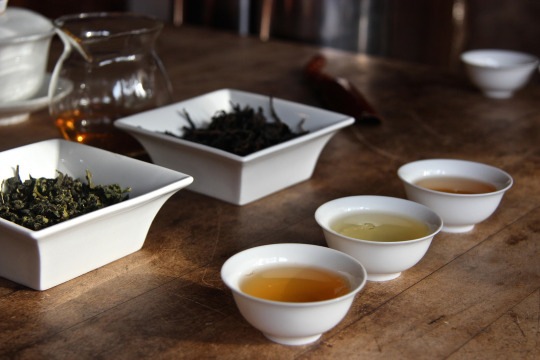
That said, if I had to pick favorites...
Wu Yi oolongs. You just can't beat that flavour profile, the mix of flowers, roasted nuts and what they call "cliff melody" (basically Wu Yi mountains terroir). They are complex, versatile (some teas can be ruined by water that's too hard or to soft, with these guys it just draws out a different part of the flavour spectrum) and pair with anything. Proper tea ceremony? Perfect. Something to serve to guests with mild blue cheese and some nuts? Even better, cheese enhances the flower aspects, it's honestly better than any wine pairing. Casual cup that goes together with vegetables roasted with herbs (yes, I sometimes drink tea with my dinner)? Great as well.
My favorites would probably be Wu Yi Shui Xian (daffodil, a bit of dried plum and a bit of gentle smoke), Roi Gui (eglantine and cinnamon, roasted notes, a bit of malt) and Da Hong Pao (this one is tricky, the versions of DHP you can get your hands on without being a government official are all blends, so technically it can mean anything, but most versions keep a lovely balance of smoke, sweetness, currant flowers and metallic notes). Bei Dou if I can find it (bisquit, oak, orchid, smoke, a bit of minerality).
Jin Jun Mei. My autumn favorite, the *prettiest* tea in the universe when done right, with notes of malt, rye bread, and wild strawberies, usually still very good when done wrong (chocolate, rose, physalis plants, orchid...).
Dong Ding oolong, one that I would use for introducing someone to fine teas. Freshly cut grass, wild honey, a touch of caramel and what I can only describe as a feeling of cold wind from a lake. Delicate and ridiculously pretty.
Hei Cha, "true" black teas that are more fermented than even pu-erh. Teas of bordelines dwellers and northern barbarians and I am one, after all. "Korla Pear" Hua Zhuan is my latest favorite. Wood and pear notes, one can't really describe it. Lu Bao if you live in a dry climate and let it sit on a shelf for a couple of years is also very good (wet autumn leaves, ink, charcoal and snowdrop flowers). Don't ever drink it fresh, it's awful and bitter and has a note of rotten vegetables. If you can forget it on a shelf for twenty years it's a transcendent experience and I can't recommend it enough.
Anything white, really. White teas are a very special art. They are pretty much tea herbarium. They are made with next to no processing and mostly are just gently dried in the sun, so you get the purest interpretation of the leaf itself. This leads to... experiments. There are the classics, like Bai Mu Dan with its notes of peony, wormwood and plant milk. There's the experience of drinking teas gathered before Ching Ming (if the year is good), the first tea of the year with its gentle minerality that's a bit like the scent of thawing snow.
There are insane things like letting them age for years like you would shen pu-erhs (Yin Zhen is honestly better in this version, if you ask me), I can't really describe that scent, it's wildflowers and autumn leaves both and something that feels like a mix of wormwood fluff and dried strawberries.
There are leaves that would normally be used for pu-erhs processed as white teas and these tend to have lovely cantaloupe and honey flavour. Honestly, the fun part about white teas is often not just the taste but how punk are the things teamakers do with the leaf and the fact you can taste nuances that would be otherwise overshadowed by the processing technology.
Chinese yellow teas. I actually don't remember names, I used to pick them by scent. Some have a "flowers and ink" scent that is very precious to me.
I think that's about it. I can't choose a single favorite between these.
24 notes
·
View notes
Text
Zhen - Day 94
Race: Raptor
Alignment: Dark-Law
August 15th, 2024

As it would turn out, the concept of a cryptid isn't just exclusive to the US and Japan. Shocker, right? Most cultures have their own monsters that go bump in the night, so it'd make sense that they also have beings that may or may not exist. One place may have a certain cryptid completely unique to its own culture, which relies on tropes or strange occurrences in that area, and many of these cryptids differ completely from many others around the world. This, of course, leads to today's Demon of the Day, a recurring demon that many of you likely know well from obnoxious random encounters on the Nocturne world map: Zhen.
Though calling Zhen (full name Zhenniao) a cryptid is a bit of a stretch, many myths attest to its general concept, that being a brightly colored bird who spreads poison from its feathers. This is seen first and foremost in the Classics of Mountains and Seas, a classical compendium of several mythical beings, wherein Zhenniao is described as follows.
[Zhenniao] is as large as an eagle, it is purple and green with a long neck and a scarlet beak. It eats snakes' heads. The male is called "Revolving Sun" and the female is called "Yin shade." [The Author of the original text] also notes this bird is so poisonous that if one of its feathers is put in someone's drink or food, it will kill that person.
While I think this is the earliest reference to Zhen, several different translations and commentaries about the bird point to different aspects of it. Guo Pu, a famous scholar from ancient China, said that there was more than just one type of this bird, interestingly enough. He describes a pair, one of which being the malevolent one pictured above, and another being a benevolent species of pheasant who would eat poisonous insects around Mount Yaobi, which was a mountain in southern China, I think??? Still, that's all there really is to Zhen, given its lack of references and mythology surrounding it. Pretty short one today, alas.
The design itself is pretty damn good, honestly, though it's far less bird and more of a weird, skeletal thing in the vague shape of a bird. Regardless, though, it's a pretty good design, and one that represents this poisonous fowl rather well.
15 notes
·
View notes
Text
What's in a Name — Miraculous Ladybug
5. KWAMI
5.1. Yin-Yang Tier
Tikki: according to Thomas Astruc, it's supposed to mean "happiness" in a language he can't remember. After doing some research, I believe he was going for the Greek word "eftychia". Interestingly enough, this word had the meaning of "good luck" in Ancient Greek, and is ultimately derived from the Ancient Greek word "tyche", meaning "luck, fortune", which was also the name of the Greek goddess of luck, equivalent to the Roman goddess Fortuna.
Plagg: from English "plague".
5.2. Top Tier
Trixx: from English "tricks".
Wayzz: either from English "wise" or "ways".
Pollen: self-explainatory.
Nooroo: either from the Japanese pronunciation of English "null", as this was his name in previous drafts, or from an Arabic word meaning "light". That, or "neuro-".
Duusu: either from French "douce" ("sweet", F), Luxembourgish "duuss" ("gentle, tender, soft") or various Slavic words for "soul", like Polish "dusza" or Czech "duše".
5.3. Zodiac Tier
Mullo: from French "mulot", meaning "field mouse". It was initially supposed to be Toppo, from the Italian word for mouse ("topo"), but this was changed during development. This latter name did, however, still end up being used once in the English dub of Kwamibuster.
Stompp: self-explainatory.
Roarr: self-explainatory.
Longg: from Mandarin "long", meaning "dragon".
Sass: most likely from the hissing sound a snake makes.
Kaalki: in reference to Kalki, the tenth avatar of the god Vishnu, which is depicted as a white horse.
Ziggy: most likely from German "Zeige", meaning "goat". Is also a reference to Ziggy Stardust.
Xuppu: in reference to Xu Sheng, a character from "Journey to the West" who initially rejects the existence of Sun Wukong before becoming a devotee of his in the story "The Great Sage, Heaven's Equal" by Pu Songling. The name is a blending of the character's name and the author's.
Barkk: self-explainatory.
Orikko: from "cocorico", which is the French word for the sound a rooster makes.
Daizzi: in reference to the pig character Zhu Baije from "Journey to the West", who is often called "Dai Zi", meaning "idiot".
5.4. Others
Liiri: from Albanian "liri", meaning "freedom".
#the ml wiki lists the language tikki's name is derived from#as hindi#this is incorrect#the hindi word for happiness is 'khushi'#next up: other - s1#series: what's in a name?#what's in a name: miraculous ladybug#miraculous ladybug#kwami#tikki#plagg#wayzz#nooroo#duusu
24 notes
·
View notes
Text
List of all 144 Espers in Dislyte (alphabetized)
Abigail (Frigga)
Adrina (Chantico)
Ahmed (Geb)
Ain (Ptah)
Alexa (Aphrodite)
Alice (Gullveig)
Alolin (Pazuzu)
Anesidora (Pandora)
Anna (Persphone)
Arcana (Hermes)
Archibald (Mictlantecutli)
Asenath (Nefertem)
Ashley (Heimdall)
Aurelius (Ullr)
Bai Liuli (White Snake)
Bardon (Baldr)
Berenice (Bastet)
Biondina (Poseidon)
Bonnie (Eris)
Brewster (Garmr)
Brynn (Valkyrie)
Camille (Hati)
Cang Ji (Cang Jie)
Catherine (Hela)
Cecilia (Isis)
Celine (Siren)
Chalmers (Idun)
Chang Pu (Yao Ji)
Chloe (Medea)
Chu Yao (Tai Yi)
Clara (Hera)
Daniel (Charon)
David (Jason)
Daylon (Sobek)
Dhalia (Calypso)
Djoser (Atum)
Donar (Thor)
Drew (Anubis)
Eira (Freya)
Elaine (Nyx)
Elliot (Thoth)
Embla (Ymir)
Emma (Jade Rabbit)
Ethan (Pan)
Everett (Tyr)
Fabrice (Freyr)
Falken (Horus)
Farrah | Aminah (Tiamat | Abzu)
Fatum Sisters (Nornir)
Feng Nuxi (Nuwa)
Feng Xun (Fu Xi)
Freddy (Fenrir)
Fu Shi (Suan Ni)
Fumitsuki (Kaguya-hime)
Gabrielle (Njord)
Gaius (Zeus)
Ginny (Hestia)
Hailey (Hephaestus)
Hall (Hodur)
Helena (Helen)
Heng Yue (Chang’e)
Hilda (Hypnos)
Hyde (Hades)
Ife (Meretseger)
Ikki (Tsukuyomi)
Intisar (Kauket)
Jacob (Jormungand)
Javid (Shamash)
Jeanne (Gerd)
Jiang Jiuli (Chiyou)
Jiang Man (Meng Po)
Jin Qiu (Ru SHou)
Jin Yuyao (Queen Mother)
Jin-Hee (Dokkaebi)
Kara (Serket)
Kaylee (Anuket)
Koharu (Ame No Uzume)
Laura (Neith)
Lauren (Heket)
Layla (Medjed)
Leon (Vali)
Leora (Athena)
Lewis (Ares)
Li Ao (Tao Tie)
Li Guang (Vermilion Bird)
Li Ling (Nezha)
Liam (Xolotl)
Lian (Jiao Tu)
Lin Xiao (White Tiger)
Long Mian (Ao Bing)
Lucas (Apollo)
Luo Yan (Yanluo Wang)
Lu Yi (Dayi)
Lynn (Hathor)
Mateo (Prometheus)
Mavis (Mictecacihuatl)
Mei (Kaya-no-Hime)
Melanie (Medusa)
Meredith (Scylla)
Mona (Artemis)
Narmer (Ra)
Nick (Magni)
Nicole (Nephthys)
Norah (The Muses)
Odette (Skadi)
Ollie (Osiris)
Ophelia (Thanatos)
Parmi (Ninsun)
Pritzker (Mimir)
Q (Eros)
Raven (Odin)
Ren Si (Black Tortoise)
Sachiko (Hare of Inaba)
Sally (Sif)
Sander (Set)
Sienna (Gaia)
Stewart (Dionysus)
Su Jue (Daji)
Tang Xuan (Sun Wukong)
Tang Yun (Six-Eared Macaque)
Taylor (Hercules)
Tevor (Sphinx)
Tiye (Nut)
Toland (Tezcatlipoca)
Triki (Loki)
Uday (Sopdet)
Unas (Shu)
Unky Chai (Yue Lao)
Valeria (QUetzalcoatl)
Wu You (Dijiang)
Xiao Yin (Azure Dragon)
Xie Chuyi (Death Guard Hei)
Xie Yuzhi (Death Guard Bai)
Xuan Pin (Jiutian Xuannu)
Yalina (Mamitu)
Yamato (Izanagi)
Ye Suhua (Shao Siming)
Yu Ran (Bai Ze)
Yu Xu (Jing Wei)
Yun Chuan (Yang Jian)
Yuuhime (Izanami)
Zelmer (Sekhmet)
Zhong Nan (Zhong Kui)
Zora (Amunet)
#I’m excited for the popularity poll thing we have coming up#I’ll probably repost this list with less characters when the first elimination round ends#dislyte
17 notes
·
View notes
Text
Chapter 81
In fact, it was agreed that she would practice her calligraphy at first, but Pan'er was a duplicitous one.
When the paper was laid out, she said she missed the baby and told the Prince that Wan Yin could stand. The prince didn't believe her, not to mention that the eldest county princess didn't learn to walk until she was over a year old, and that the second and third county princesses had been carried by their nannies for over two years.
Pan'er asked the nurse to bring the baby over.
The weather was hot and even if there were ice pots in the house, it did not help much with the heat. Wan Yin and Yue Er were both wearing big red bibs with half cut shorts underneath.
Once the clothes were taken off, it was obvious that Wan Yun was much fatter than Yue Er, but Yue Er was not shorter than his sister, rather he was taller than her, only that he was thinner than her.
As soon as they saw their father, the two children's eyes lit up, only Wan Yin was more obvious, stretching out her little hand towards the prince and asking for a hug.
"You want a hug when you see your father, little one." Pan'er laughed and tucked her into the Prince's arms, picking up her son again.
At that end, the crown prince had just gotten his daughter into a hug when Wan Yin was unhappy, grabbing the crown prince's lapels and struggling upwards, causing the crown prince to get his hands dirty.
"What does she want from me?"
Pan'er gloated, "She wants to stand. Don't hold her too tightly as you hold her like this, this girl is getting more and more energetic, two nannies can't even keep an eye on her, two more palace maids have to be added, four people surround her every day, each one is exhausted."
As she said this, she put the Yue'er aside and went to help the prince arrange the cuddling position, finally there was no one to hold her down, so Wan Yin tugged on the prince's lapel and stood up.
Standing up she was still restless, her little feet stamping on the Prince's thighs, her mouth making excited oohs and aahs as if she wanted to move up.
"Her legs are very strong." The Prince looked at his daughter with amazement in his eyes.
At that moment, there was a crunching sound at the kang table, but it was Yae'er bracing herself to reach something on the kang table and knocking over the tealight.
"What do you want, Yue'er? Something to eat, or something to drink?"
Without even looking at the kang table, Yue'er looked over there, stretched out his two little fat hands and patted them, spreading them out.
This was for a hug.
Or so Pan'er had taught the two children; children the size of this month were at the stage where they couldn't say what they wanted to say, couldn't walk if they wanted to, but were beginning to have their own emotions and meanings. If they are not satisfied, they will throw a tantrum and cry.
Pan'er can only usually instruct the nannies to teach them to distinguish things, to point at what they want to eat and to point at the cup if they want to drink. Both children were very smart and could recognise things after two teachings.
As for the hugging action, Pan'er had been specially instructing them to do it.
There was no other way to put it, as Yue'er was already well behaved, and his emotions were not as outgoing as his sister's. When Wan Yin wants to be held, she will reach out and struggle over there, while he alone just sits there and looks on. Of course this bewildered look was in Pan'er's own head, anyway she just couldn't stand it, so she called her son privately when he wanted a hug and clapped his hands, so mother would know.
"This is jealousy of Yue'er, see father only hug sister, not hug Yue'er isn't it?"
Obviously Pan'er's words were too complicated for Yue'er to understand, but while the child didn't understand, the child's father did, and the words were meant for the child's father to hear.
The child's father gave her a look and said 'many tricks', put his daughter down and took his son from her.
She asked Xiang Pu and the girls to clean up the bed table and tucked her in front of it, and the stupid girl started to fight with it.
The prince still knows his son and knows that he is more obedient and well-behaved than his daughter.
Every time he carried Wan Yin, she would toss and turn on him, tugging at his sash and pulling at his belt, but he would sit still.
But this time, the boy did not behave himself either, and tugged at the Prince's lapel with his hands. It was not enough to tug on it, he also stood up with a whoosh.
Amongst all the surprised eyes in the room.
Pan'er reacted the most: "When did you know how to stand, mother didn't know!"
Anyway, leaving Pan'er to look, she did not find any intention of her son to sit unwillingly, he was quiet and well behaved, this quiet and well behaved was relative to his sister, on the other hand the well behaved one had done something amazing today.
The boy could not speak, and naturally he could not answer her.
He slowly sat back on the prince's lap, with a breezy and light-hearted look of 'having done his job and left his work and name behind'.
Of course, this is all in the minds of outsiders, but compared to Wan Yin's usual stammering, this can give people a sense of profoundness and inscrutability.
The prince was surprised, but he also thought that the child was smart enough to know how to be jealous and how to behave.
A child only ten months old.
The word 'prodigy' popped into his head as he locked eyes with a pair of equally slender but several sizes smaller than his. But the Prince was not without experience and knew that it was still a little early to say this.
After all this fuss, it was naturally getting late and it was time for the evening meal.
By now, Wanyin and Yue'er could start to eat some food, which was not too hard, such as congee, soup and softly cooked noodles.
Originally, the nannies did not approve of this, they had not even passed the age of one year, how could they add rice. Not to mention the fact that children from wealthy families were fed milk until they were over a year old, and children in the palace were fed milk until they were three or five years old.
Everyone in the palace thought that milk was good, especially human milk.
In her previous life, because she had fed him herself, by the time he was seven or eight months old, there was not enough milk to go around, so she had no choice but to supplement him with congee and noodles.
She had no choice but to supplement him with congee and noodles, but he ate very well and his teeth grew well, so he gradually ate more and more, and the milk became a supplement.
The child raised in this way was very strong, and Yue-er was hardly ever ill when he was young, and little sixteen was raised in the same way later on, and was also raised extremely well. So this time Pan'er didn't hesitate much, and when the two children were more than seven months old and already showed a great interest in eating, she asked the nursemaids to add some thin porridge to them, adding it gradually and gradually.
But this was kept from the Prince for the time being, so when it was time to eat, Pan'er had the children carried off...
After the meal, they had to digest their food, so naturally they brought up the practice of writing.
The two of them went to the study.
The prince looked at her posture and found nothing wrong with Pan'er's posture, what was wrong was the strength of her strokes, that is, the improper force of her wrist.
He went over and taught her how to write by hand, "When you should be gentle, you should be precise, when you should be heavy, you should write with strength when you are horizontal, vertical, skewed, pressed and folded, and when you turn, you should write with strength, and the style of the character will come out ......"
Pan'er listened with dizziness and inevitably became a bit distracted.
The side of his face, already handsome, but also so focused, the smell of his body also smells good. The jaw is especially beautiful, Paner once learned that the quality of a person's face is related to the nose, but also to the jaw. As long as a person had a fine jaw, he or she would not be ugly.
She couldn't resist taking a bite on his jaw, a soft one.
Thinking she was being naughty again, the Prince grabbed her hand with his other and squeezed it, who knew she had bitten again and licked twice on it.
Now that the meaning wouldn't be misinterpreted, the Prince's hand moved down and squeezed at her thighs and buttocks.
The rest was water under the bridge.
The Prince wasn't too old-fashioned, but it was the first time he had done this in the study, which was separated from the second room by a curtain, not soundproofed at all, and the slaves were on guard outside. It was a thrilling and exciting experience for both of them, and by the time the session was over, not only had they failed to practise their writing, but the book case was in a mess.
In particular, Pan'er's newly made dress had been stained in several places with black ink, and she would no longer be able to wear it.
"It's your fault."
The point was that the dress was made in a good colour scheme, smoke with dark peachy red chambray, and there was hardly any need to add any embroidery to make it a beautiful dress.
It was a tribute fabric, too.
This was the only one Pan'er had, and it was a gift from Empress Fu. Apart from making this dress, the rest was used to make two baby jackets.
The Prince was also a little embarrassed, and there is no need to go into details as to why he was embarrassed.
"Ahem, a new batch of material has been sent from the House of Internal Affairs, I will ask Fu Lu to send you some tomorrow."
"What about these?" Pan'er was referring to the mess on the table, the dress was soiled, think of all the papers and stuff.
"Let the underlings clean it up." The prince said with nonchalance, and then the man was gone.
Gone?
Yes, off to the west bedroom.
Leaving Pan'er in tears looking at the mess all over the table, he was so mean she was embarrassed and had to clean it up herself. She crumpled up all the papers that looked suspicious and threw them into the fire pit, then called for Xiang Pu.
"Master, is everything all right?" Xiang Pu thought that the two masters had lost their temper, otherwise why else would the prince have gone to the bedroom alone.
"What can be wrong? It's just that Master asked me to practise my calligraphy, and I spilled the inkstone and soiled my skirt. Take these and burn them, they're all my writing waste." She pointed to the fire and hurried away.
When they had both bathed and were lying down on the bed, the Prince suddenly laughed, in a strange way.
Pan'er asked him what he was laughing at, and he would not say.
She tickled him, and Pan'er knew where the Prince's tickles were.
He said she was a jealous woman.
If she was a vinegar bag, she was a vinegar bag, but he had already defined her anyway.
The next day Pan'er woke up late, the Prince was up and she hadn't moved yet.
When the prince had finished bathing and dressing, there was still no movement in the bed, so he could only shake his head helplessly and leave.
Last night, the Crown Prince rested at Su Liang Di's place, and everyone in the Eastern Palace knew about it, as did the Crown Princess. The Crown Princess was surprised that the Crown Prince suddenly favoured Su Liang Di so much.
It's not that the Crown Prince didn't favour Pan'er before, but the Crown Princess knew that the Crown Prince was very busy recently, so inevitably he didn't come to the backyard much.
Recently, he suddenly went to Pan'er's courtyard with a high frequency, the meaning of which could not be clearer.
But the Crown Princess didn't want to understand, because if she did, it would prove that she had taken the wrong path, and she didn't have the energy or the ability to take a second path, so she could only ignore it.
Fortunately, the Prince still appeared at the Hall of Virtue in the morning, but Pan'er did not.
"Su Liang Di is a bit unwell."
This was the explanation given by the Crown Prince, and no one dared to question it. Those who were full of questions such as what was wrong, how and why, and why were you still resting there last night when it was obvious that she was not feeling well, were all silenced by these words.
When Pan'er got up, she heard that the Prince had said that she was not feeling well, and since he had given her the benefit of an excuse, she would continue to feel unwell.
Out of this tacit and somewhat bizarre state of mind, for the next ten days or so, Pan'er was not feeling well, but she did not forget to have something sent to the Yu Qing Palace.
Sometimes it was a bowl of soup, sometimes it was a poem she had made in a poetic frenzy, and sometimes it was a story, in the words of the prince, of obscene words and songs that were not worthy of the stage.
But he was quite taken with it, and every time he received something he turned his head and made sure to come over.
He usually started with a feint of anger, saying that she was not good at learning and did not study hard enough, that the poems she wrote were not symmetrical and the words were not good. Pan'er would just pout and behave, usually ending with the prince instructing her to write a poem.
The poem was written and the words were written, so naturally the person did not have to leave, so the backyard of the Eastern Palace has recently been staging a play every day that Su Liangdi is not feeling well and the prince needs to go see her every day.
After half a month of this, Pan'er knew that there were many people outside who hated her even if she didn't leave home, but she didn't want to care about this now, the matter was made by him, and he would go to the end himself, as she was capricious for a while.
But the prince pretended not to know, and accompanied her to make a scene, rather to see who would be in a difficult situation.
This was the second time that the Crown Princess had asked the doctor to check the pulse of Su Liang Di, who was not feeling well.
Just as Pan'er couldn't help but wonder if she should stop, the doctor diagnosed her with a happy pulse.
30 notes
·
View notes
Text
Hils Watches Oh No! Here Comes Trouble - Ep 6

Okay, I don't know much about road infrastructure or Taiwanese law but if that many people have been killed and injured just in one month maybe you need to close that bit of road. How has no one sued them?

These cases are all so interesting! This one is the manifestation of prayers to keep children safe on the dangerous bit of road

I love him! He's so delighted by all the weird stuff that's happening. Total opposite of Pu Yiyong who is mostly grumpy about it

Oh no she left the bus camera footage on her desktop where anyone (Pu Yiyong) could find it.

It's been bothering me where I know him from. It's Yin Chen from LORD: Critical World! Aww I miss that drama.

So the ghost child latched onto a man who was grieving the death of his own son who died on that bit of road. Yeah, this one is going to have me sobbing I can already tell



LOL their outraged faces! And Pu Yiyong looks so pleased.

Aww pep talk from a spirit. That's nice.

This is why you always lock your computer when you leave your desk, kids. Otherwise a spirit might go and look up someone's address.

You can't be surprised at this point, surely


Oh my god it's like they're on a date while following that dude



It's his first time at an amusement park. LET HIM HAVE A STICKER! Look at his sad little face.

This is too cute I'm dying

This is like half-date half-grumpy dad taking his kid on a day trip

I love that Cao Guangyan's dad doesn't even blink when he said he skipped class to go to an amusement park, but the fact that it's with Pu Yiyong

Nooooo.....he put the thing Pu Yiyong won for him on his bag. MY HEART.

God, not only was Cao Guangyan's dad not mad that his son skipped school to go to an amusement park, he was relieved because his son was doing normal teenager things.
#hils watches#hils watches oh no! here comes trouble#hils watches twdramas#oh no! here comes trouble#twdrama
16 notes
·
View notes
Text
Cujus regio, ejus religio...
Ce dicton romain, qui peut se traduire par ''celui qui règne sur un territoire en détermine la religion'', a longtemps été un argument de base pour justifier des situations historiques, inexplicables autrement. En notre temps, dramatiquement marqué par la perte de toute culture –-et donc de toute référence sensée-- il reste plus que jamais d'actualité, contrairement à tout ce que les médias nous disent qu'il faut penser. Et il semblerait même que, le temps passant, cette bribe de l'antique sagesse non seulement surnage mieux que prévu, mais a toute sa place, aujourd'hui...
Longtemps après l'effondrement du communisme –cette pseudo-religion intouchable, sur les terres de laquelle il ne faisait pas bon ne pas souscrire à ce que croyait le chef-- on constate que dans tout le monde musulman (avec, pour un moment encore, les deux exceptions que sont mon cher Maroc et les Emirats du golfe), mais en Inde aussi, où il ne fait bon ni être musulman ni chrétien, et en Israël (passons rapidement, si vous le voulez bien, pour éviter les controverses. Mais j'y ai vécu des situations critiques), bien sûr en Chine (un seul pays, mais plus d'un milliard d'habitants), où les 2 mêmes minorités paient parfois cher le fait d'oser croire qu'il y aurait eu d'autres ''prophètes'' que Mao Tsé Tung (Mao Zedong en ''Pin-yin'') ou au Canada, soumis à Trudeau, l'idiot enragé du progressisme...
Chose curieuse, on peut, contre toute attente, ajouter la France à cette liste de régions soumises à la loi du ''Cujus regio, ejus religio'' : après un siècle (depuis 1905) pendant lequel l'anti-cléricalisme profond d'une grande partie de la classe politique a pu passer inaperçu et faire illusion en se déguisant en ''tolérance'' (tu parles !), la prétendue laïcité de la caste au pouvoir se montre pour ce qu'elle est : un laïcisme militant et exacerbé, qui guerroie inlassablement contre toute crèche, qui ferraille sans répit contre le mot-même de ''Noël'', qui est prête à toutes les démonstrations de son hostilité agressive contre les Saints, les Fêtes, les musiques, les noms de villages ou de rues, les cloches... bref contre tout ce qui pourrait rappeler que la France, ce beau fruit de la civilisation judéo-chrétienne, a été pendant des siècles ''la Fille aînée de Dieu'' ou, comme le dit un proverbe yiddish, le pays où Dieu est heureux (''Glücklich wie Gott in Frankreich'').
Le temps passant, nos leaders sont lentement tombés de la pratique affichée (De Gaulle) à une opposition affichée (Hollande) ou évidente et cachée (Macron, qui croit... et, en même temps, ne croit pas !), via la tiédeur engagée de Giscard, l'indifférence respectueuse de Pompidou, la girouette erratique de Chirac, le doute prudent de Sarkozy, et avant la ''cata'' qu'est l'hostilité des deux derniers occupants de l'Elysée, déclarée et affichée pour l'un, et ''en même temps'' pour l'autre. On peut être d'accord ou pas avec ma vision des caractères et de la religiosité de nos Présidents... mais il faut tout de même reconnaître que Macron ne tient pas ''les cultes'' en grande estime... sauf une apparence de ''soumission'' à l'islam, tant il a la trouille des nuits d'émeute, des quartiers anéantis, des bagnoles cramées et de l'impuissance des forces ''de l'ordre'', menacées.
Par exemple, on ne se souvient pas qu'il ait sérieusement demandé leur avis aux dits cultes –ou qu'il en ait tenu compte, les rares fois où il l'a fait-- pour tout ce qui concerne les lois prétendues ''sociétales'' : ni sur la remise en cause du mariage, confirmée et élargie, ni sur la PMA, ni sur la GPA, ni sur l'inscription d'un ''droit à tuer les bébés dans le ventre de leur mère'', sans cesse élargi, lui aussi (NB : comme il était beau –et tellement vrai-- le ''Infans conceptus pro nato habetur'' du Droit romain . Il mérite une traduction : 'l'enfant, dès le moment où il a été conçu, doit être considéré comme déjà né'').
Il ne se préoccupe pas davantage d'ailleurs de ce que pensent les églises, les temples, les mosquées ou les synagogues dans d'autres domaines, tels l'accueil des migrants, le ''dé-baptême'' des rues, des écoles ou des villages, la vraie liberté d'enseigner et la liberté tout court... et, tout récemment, sur l'euthanasie et le respect dû à la vie... que l'Etat a pourtant pour mission de protéger, comme on nous le rappelle sans cesse mais à mauvais escient à propos du pillage en règle des poches des automobilistes et des motards qui osent rouler au delà des stupides normes administratives (90, 80, 90, 110, 80, 70, 90... sur 1 km !) re-baptisées ''la sécurité'' par des technocrates pourvus d'un chauffeur qui, lui, s'en affranchit, ajoutant la pollution sonore d'un ''deux tons'' (pin-pon) à son non respect de la Loi !
Pourtant, nécessité faisant loi, le Président a oublié ses préjugés habituels. Sans doute parce qu'il est un peu ''paumé'' : l'échec hurlant de sa politique étrangère en général et de sa politique arabe en particulier doit (enfin !) commencer à lui peser, et il faut reconnaître que ça doit être difficile à supporter de voir que pas une seule de ses idées –qu'il croyait géniales, le pauvret-- n'est autre chose que (très) mauvaise : personne de sensé ne peut suivre les danses du ventre qu'imposent chacun de ses ''et en même temps''. Ça, ça peut passer dans un discours d'estrade. Dans la vraie vie, ça n'a pas la moindre chance de finir autrement qu'en catastrophe ! Quant à son ''quoi qu'il en coûte''... il ne pouvait nous mener qu'à la banqueroute. Bingo ! On y va tout droit.
Mais ''place au direct'' comme disent stupidement nos animateurs-télé (une bêtise de plus à leur actif : en quoi ce que dit M'ame Michu –qui était à 2 km mais a entendu un grand ''boum''-- doit-il passer avant le ''spécialiste de ceci ou cela'' ? Il est vrai que, après les ''Experts ès-covid'' et ''ès-Ukraine''... on voit débarquer des ''spécialistes de l'islam'' qui ne parlent pas un mot d'arabe...) : la situation dramatique créée par le seul Hamas, due à sa décision folle et non directement provoquée (on peut toujours remâcher de vieilles haines : ce sont des arguments, pas des raisons !), a contraint le chef de l'Etat à se rappeler qu'il existait d'autres forces dans le pays que les seuls progressistes et leur action délétère (et c'est tant mieux : c'est notre ultime espoir !).
Voilà pourquoi il a cru utile de convier, lundi dernier, les représentants des trois monothéismes à venir boire un petit kaoua à l'Elysée, ce qui tendrait à prouver que lorsque le besoin s'en fait sentir et que son rêve d'un ''vivre ensemble'' impossible est démontré irréaliste par les faits, il sait où trouver des aides salvatrices. Mais la séquence ne manque pas de sel : ''chassez le naturel, il revient au galop''. Juste après la grande marche contre l'antisémitisme (qui a entraîné la ''rabia'' de la Grande Mosquée de Paris, vite recentrée : ''Taqyia'' oblige, recommande et permet) , il n'a rien trouvé d'autre que de leur demander, à eux, ''de défendre l'universalisme des valeurs républicaines'' et, cerise sur le gâteau, de ''multiplier les actions éducatives en ce sens''... On a envie de dire : ''Pincez-moi, je rêve !''. Pourquoi ne pas carrément leur demander de devenir d'actifs militants du laïcisme anti-catho et anti-juif que pratiquent ses amis ? Ça aurait au moins eu le mérite de la franchise,et ça aurait démontré qu'il connaissait notre adage du jour, ''Cujus regio, ejus religio'' : en Macronie, les seules ''valeurs'' sont ces ''vertus chrétiennes devenues folles'' que la République à fait siennes, et le laïcisme militant est la religion d'Etat. D'ailleurs, ses grands-prêtres veulent l'inscrire dans notre Constitution, c'est tout dire.
Sa terreur ? La crainte de voir le conflit palestinien ''importé'' dans notre pays par ''les communautés religieuses'' (sic ! Ne riez pas, ce serait cruel !). Mgr de Moulins-Beaufort et le grand Rabbin Haïm Korsia ont découvert qu'ils étaient les porteurs potentiels de violences et de terrorisme dans notre cadre national. Mais dire ''l'islam'', apparemment, lui pose un problème. Question : d'où vient cette impossibilité chronique de prononcer le mot ''islam'' là où il s'impose, parfois avec véhémence, comme le fait Abdelali Mamoun, l'Imam de la grande Mosquée de Paris, qui nie, en se tortillant les neurones pour avoir l'air de ne pas dire l'indéniable... ou le dire sans le penser complètement...? On se perd en conjectures... Camus aurait dit : ''Mal nommer les choses, c'est ajouter au malheur du monde''. Qu'il l'ait dit ou pas, est-il besoin d'aller plus loin ?
H-Cl.
2 notes
·
View notes
Note
🔥
^opinion on this
🎩🎸🍕🏴☠️- *Incoherent screeching, stumbling and panicking*
🎩- SO-OMEBO-ODY PU-PUT IT O-OUT!
🏴☠️- F-REDD-DDY WE BE-E TRY-YIN!
🍕- QU-UICK-K! US-SE FRED-DY'S HA-AT!
🎩- Wa-ait w-what? Wai-it NO BON-NNIE PU-UT MY HAT D-
🎸-I GO-OT IT!
*Proceeds to pat the fire down with his hat only for it to catch into flames itself*
🎩-

🎩- MY-Y HAT!
👻- *&^%^&*(^&&&* (Stupid Idiots) *Grabbing a fire extinguisher, Goldie proceeds to put out the fire*
#withered freddy#five nights at freddy's#withered bonnie#withered chica#withered foxy#ask#ask blog#fnaf#fnaf movie#five nights at freddys#william afton#pinned intro#withered animatronics#ask the characters#ask the withereds#fnaf 2#five nights at freddy's 2#2#anon#fire#chaos#anonymous
3 notes
·
View notes
Text
Sun Wukong Raids the Lion Camel Ridge (2022) 孙悟空大闹狮驼岭
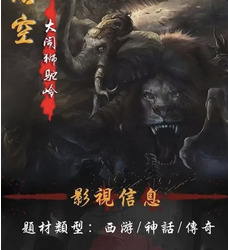
Director: Guo Yulong Starring: Miu Tse / En Jing / Li Faguang Genre: Action / Fantasy Country/Region of Production: Mainland China Language: Mandarin Duration: 90 minutes Type: Retelling
Summary:
In Journey to the West, Sun Wukong occupied the top of the mountain, became a demon king, made havoc in the underworld, changed life and death, fought against the heavenly soldiers, and disturbed the heavenly court. Sun Wukong has never been afraid of all kinds of anti-sky behaviors in the past. However, when he passed Lion Camel Ridge on his way to protect Tang Seng to learn scriptures in the West, Sun Wukong was afraid, and here, he even cried twice in a row. So, how terrifying is Lion Camel Ridge? How could Sun Wukong be so scared?
Lion Camel Ridge is a personal hell, and it is even worse than the bloody scenes of the 18th hell in the underworld. In addition, all the people living in Lion Camel Ridge Country were ordinary people, but the three demons in Lion Camel Ridge ate up all the people in the city, which led to the terrifying scene where the city was full of monsters. The strength of the Three Demons of Lion Camel Ridge is even more terrifying;
The three demons of Lion Camel Ridge are the Azure Lion Spirit, the White Elephant Spirit, and the Golden-Winged Roc. Among them, the Azure Lion Spirit, like Sun Wukong, once made troubles in the heavenly palace and swallowed hundreds of thousands of heavenly soldiers in one gulp; the nose of the White Elephant can make a person with an iron back and a bronze body immediately lose their souls; the Golden-Winged Roc's fighting speed is extremely fast. Relying on its own speed advantage, the Roc once beat Sun Wukong in seconds, and he also has a magic weapon "yin and yang two gas cylinders" that can turn people into pus and blood. It was because Sun Wukong was taken by this magic weapon that he was burned in pain by three fire dragons in the bottle, so he cried in the bottle. And this is also the first time Sun Wukong cried at the level of Lion Camel Ridge.
Of course, Sun Wukong listened to the rumor that Tang Seng was dead when he had nothing to do with the three demons of Lion Camel Ridge, so he ran to the Tathagata Buddha and cried loudly. This was the second time he cried in Shituoling. From the two cries of Sun Wukong, it can be seen that he is scared. The first time he cried was because he was afraid that he would die in the "two cylinders of yin and yang"; plus listening to rumors that's why he cried again. The Tathagata Buddha saw that Sun Wukong was in such a mess, so he led the strongest lineup on Lingshan to the Lion Camel Ridgeto to subdue the demons. The Lion Camel Ridge are not only powerful, but also have a powerful background behind them. The Lion and the White Elephant are the mounts of Manjusri and Puxian Bodhisattva, and the Roc is the uncle of the Tathagata Buddha. It can be said that the background behind the three monsters of the lion camel mountain is more terrifying than their own strength. Facing such a powerful opponent, Sun Wukong's defeat is a reasonable thing.
Even though Shituoling is terrifying, but as high-level figures in Lingshan, Tathagata, Manjusri, and Puxian indulged their subordinates to go to Lion Camel Ridge to cause disaster, and even created such a terrifying scene, this should be the level of Lion Camel Ridge Scariest thing ever.
Source: http://chinesemov.com/2022/Sun-Wukong-Raids-the-Lion-Camel-Ridge.html
Link: N/A
#Sun Wukong Raids the Lion Camel Ridge#孙悟空大闹狮驼岭#jttw media#jttw movie#movie#lost media#live action#retelling#sun wukong#Little Drill Wind#azure lion king#golden winged peng#white elephant demon#yellow tooth elephants demon#golden winged roc#rewrite
12 notes
·
View notes
Text
A Delightful Surprise: Exploring the World of Chinese Tea with My Beloved Girlfriend

In the midst of a scorching summer, I find myself wanting to surprise my beloved girlfriend with a thoughtful gesture. Knowing her affinity for Chinese tea, I am determined to embark on a journey to discover the captivating world of Chinese tea culture, together.
Chinese tea, renowned for its rich history and deep-rooted traditions, offers a myriad of flavors and aromas that can transport one's senses to distant lands. With excitement in my heart, I plan a special day for us, immersed in the beauty of tea.
We begin our adventure by visiting a local tea shop, adorned with delicate porcelain teapots and vibrant tea leaves. The shopkeeper warmly greets us and guides us through a selection of teas, explaining the unique characteristics of each. We marvel at the names - Dragon Well, Tie Guan Yin, Pu-erh, and more - each carrying a tale of its origin and cultural significance.
Next, we attend a tea ceremony, a refined art form that requires patience, precision, and appreciation. The ceremony unfolds gracefully as the tea master performs precise movements, pouring water with elegance and grace. We learn the importance of steeping time and water temperature, and the gentle art of sipping tea to savor its nuanced flavors.
Inspired by our newfound knowledge, we decide to recreate a traditional Chinese tea ceremony at home. We carefully arrange an exquisite tea set on a low table, complete with a delicate porcelain teapot and matching cups. With focus and reverence, we brew our chosen tea, marveling at the swirling colors and mesmerizing aromas that fill the room.
As we sit together, sipping the rejuvenating elixir, we share stories and dreams. The gentle warmth of the tea infuses our spirits, creating an intimate atmosphere of connection and love. We express gratitude for the moments we share, grateful for the discovery of a new dimension of our relationship through the appreciation of Chinese tea. In the heat of summer, my surprise for my beloved girlfriend blossoms into an unforgettable adventure, exploring the enchanting world of Chinese tea. Our journey not only deepens our bond but also provides us with a glimpse into the vast cultural heritage that tea embodies. As we continue to cherish these shared moments, our love, like the lingering aroma of a fine cup of tea, only grows stronger with time.
2 notes
·
View notes
Text
Holidays 3.25
Holidays
Anniversary of the Arengo (San Marino)
Bed-In For Peace Day
Celebrate Rivers, Lakes & Ponds Day
Cultural Workers Day (Russia)
Day of Solidarity with Detained & Missing Staff Members
Day of Tourists
Fall of Sauron Day
Feast of the Annunciation (Western Christianity) (a.k.a. ...
Annunciation of the Blessed Virgin Mary (Roman Catholic)
Bengali Genocide Remembrance Day (Bangladesh)
Conceptio Christi
Feast of the Incarnation
First Joyful Mystery of the Dominican Rosary
Lady Day (Old England)
Quarter Day (England, Ireland & Wales) [1 of 4]
Solemnity of the Annunciation
Vårfrudagen or Våffeldagen (Waffle Day; Sweden)
Feast of the Militants (San Marino)
Flower Day (Elder Scrolls)
FND Awareness Day (UK)
Freedom Day (Belarus)
Guan Shi Yin Pu Sa (Buddhist Goddess of Mercy)
International Day of Remembrance of the Victims of the Transatlantic Slave Trade (UN)
International Day of Solidarity with Detained and Missing Staff Members (UN)
International Day of the Unborn Child
International Kiss an Italian Day
International Procrastination Day
Just Be A Rock Day
Lady Day
Love Your Neighbor Day (Discordian)
Maryland Day
Medal of Honor Day
Mother’s Day (Slovenia)
National Bridesmaid Day
National Cerebral Palsy Day
National Dante Day (Italy)
National Day of Celebration of Greek and American Democracy
National Forest Day (Romania)
National Handwashing Awareness Day (Belize)
National Newfoundland Dog Day
National OmazingYou Day
National Peacock Day
New Zealand Army Day
Non-League Day (UK)
Nowruz (New Year) [Day 6, Around Spring Equinox] (a.k.a. ...
Navruz (Tajikistan)
Novruz (Azerbaijan)
Numbskulls and Clodhoppers’ Dance Day (Fairy)
Old New Year's Day (England, Ireland, US, Wales; until 1751)
Pisan New Year (Italy)
Quarter Day (England, Ireland & Wales) [1 of 4]
Struggle For Human Rights Day (Slovakia)
Talent Day (EU)
Test Optional College Day
Tichborne Dole (Alresford, Hampshire, England)
Tolkien Reading Day
Triangle Shirtwaist Factory Fire Anniversary Day
Walk in the Sand Day
Why? Day
Wiki Day
World Retrospective Day
Food & Drink Celebrations
International Waffle Day
National Lobster Newburg Day
National Michelle Shafer Half Moon Cookie Day
National Waffle Day (a.k.a. Våffeldagen; Sweden)
National Women in Wine Day
Pecan Day
4th & Last Saturday in March
Be Mad Day [4th Saturday]
Bike Store Day (Canada) [4th Saturday]
Brother and Sister Day [Last Saturday]
Earth Hour (turn off your lights for 1 hour @8:30 pm local time) [Last Saturday]
Endometriosis March Day [4th Saturday]
Global Sisterhood Day [Last Saturday]
Start That Book [Last Saturday]
Support Women Artists Now Day [Last Saturday]
Walk in the Sand Day [Saturday after Spring Equinox]
World Day for the End of Fishing [Last Saturday]
Independence Days
Greece (from the Ottoman Empire, 1821)
Feast Days
Ælfwold II of Sherborne (Christian; Saint)
Barontius and Desiderius (Christian; Saint)
Brian Michael Bendis Day (Church of the SubGenius; Saint)
Day of the Shining Ones of Heaven Move Upstream (Ancient Egypt)
Discordians for Jesus Day (Discordian)
Dismas, the "Good Thief" (Christian; Saint)
Empress Menen Day (Rastafari)
Eric the Parrot (Muppetism)
Feralia (Day of Purification; Pagan)
Festival of King Amenhotep I (Ancient Egypt)
Hilaria (a.k.a. Cybele’s day; Day of Joy and Old Roman Spring Festival; Ancient Rome) [also 11.3]
Humbert of Maroilles (Christian; Saint)
Mahavir Jayanti (Jainism)
Manatee Appreciation Day (Pastafarian)
Marie-Alphonsine Danil Ghattas (Christian; Blessed)
Omelyan Kovch (Ukrainian Greek Catholic Church)
Plato (Positivist; Saint)
Quirinus of Tegernsee (Christian; Saint)
Rhino Appreciation Day (Pastafarian)
Sacrifice to Kronos (Ancient Greece)
Lucky & Unlucky Days
Taian (大安 Japan) [Lucky all day.]
Premieres
April and the Extraordinary World (Animated Film; 2016)
Barry (TV Series; 2018)
The Bachelor (TV game Show; 2002)
Batman vs. Superman: Dawn of Justice (Film; 2016)
Blackboard Jungle (Film; 1955)
Everything Everywhere All At Once (Film; 2022)
Free Culture, by Lawrence Lessig (Book; 2004)
Life After Death, by Notorious B.I.G. (Album; 1997)
The Lobster (Film; 2016)
Machine Head, by DeepPurple (Album; 1972)
Mr. Blandings Builds His Dream House (Film; 1948)
Muscle Beach Party (Film; 1964)
Only the Lonely, recorded by Roy Orbison (Song; 1960)
Ring of Fire, recorded by Johny Cash (Song; 1963)
Surfin’ U.S.A., by The Beach Boys (Album; 1963)
Sword in the Stone (Animated Disney Film; 1983)
Valiant (Animated Film; 2005)
The Wapshot Chronicle, by John Cheever (Novel; 1955)
Today’s Name Days
Judith, Lucia (Austria)
Blaga, Blago, Blagovest, Blagovesta, Blaguna, Evangelina, Mariyana (Bułgaria)
Kvirin, Lucija (Croatia)
Marián (Czech Republic)
Maari, Maarika, Maarja, Manni, Mari, Maria, Marie, Marika, Marili, Marja, Marje, Marjo, Marju (Estonia)
Aava, Aija (Finland)
Humbert (France)
Lucia, Verkündigung (Germany)
Ethnegersia, Evaggelos, Evangelos, Vangelis (Greece)
Irén, Irisz (Hungary)
Annunciazione, Annunziata, Nunzia, Nunzio (Italy)
Māra, Marina, Marita, Mārīte (Latvia)
Normantas, Normantė (Lithuania)
Mari, Maria, Marie (Norway)
Dyzma, Ireneusz, Lucja, Łucja, Lutomysł, Maria, Mariola, Wieńczysław (Poland)
Marián (Slovakia)
Anunciación, Dimas, Encarnación, Humberto (Spain)
Allegra, Chiquita, Teena, Tina, Tiny (USA)
Today is Also…
Day of Year: Day 84 of 2023; 281 days remaining in the year
ISO: Day 6 of week 12 of 2023
Celtic Tree Calendar: Fearn (Alder) [Day 7 of 28]
Chinese: Second Month 2 (Gui-Mao), Day 4 (Ren-Wu)
Chinese Year of the: Rabbit 4721 (until February 10, 2024)
Hebrew: 3 Nisan 5783
Islamic: 3 Ramadan 1444
J Cal: 23 Ver; Twosday [23 of 30]
Julian: 12 March 2023
Moon: 19%: Waxing Crescent
Positivist: 28 Aristotle (3rd Month) [Plato]
Runic Half Month: Beore (Birch Tree) [Day 15 of 15]
Season: Spring (Day 6 of 90)
Zodiac: Aries (Day 5 of 30)
2 notes
·
View notes